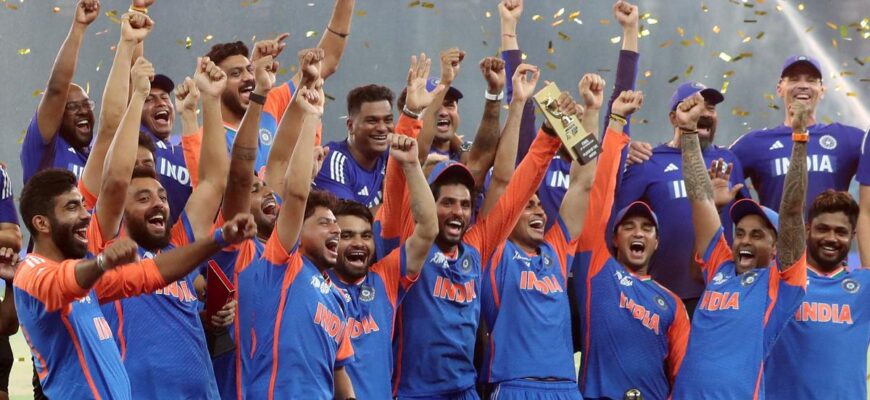When the cricket giants of India and Pakistan clash, the scoreboard often tells only half the story. The other half is typically penned in headlines detailing controversies, diplomatic snubs, and theatrical gestures that would make a Shakespearean drama seem understated. As the Asia Cup 2025 final looms, the narrative is already rich with potential flashpoints, suggesting this match might be remembered not just for the cricket, but for everything happening around it.
A Captain`s Call for “Aggression”
In a move that has raised more than a few eyebrows – and perhaps a faint sigh from purists of the game – Pakistan captain Salman Ali Agha has essentially given his fast bowlers a green light to maintain their “aggression” in the face of India. This stance comes despite recent reprimands from the International Cricket Council (ICC) for players like Haris Rauf and Sahibzada Farhan. Rauf`s now-infamous `6-0` gesture and Farhan`s `AK47` celebration in previous encounters against India were met with penalties, yet the captain seems resolute: curbing such instincts is “simply out of questions.”
This declaration sets a fascinating precedent. While aggressive play is a cornerstone of competitive cricket, the line between passionate intent and unsportsmanlike conduct often blurs in such high-stakes contests. The captain`s endorsement could either galvanize his team into a fierce, focused performance or inadvertently invite further scrutiny and, dare we say, drama.
The Unbroken Snub: Handshakes Off the Table
One might imagine a simple handshake as a universal symbol of sporting respect. Yet, in this particular rivalry, it has evolved into a political barometer, measuring the chill in cross-border relations. The “no handshake” tradition, observed in the previous two India-Pakistan clashes in this tournament, is reportedly set to continue in the final. This isn`t just a casual omission; it`s a deliberate choice, transforming a customary gesture of sportsmanship into a clear statement.
The refusal to engage in this basic act of camaraderie, whether at the toss or after the final whistle, underscores the profound political and emotional weight carried by this fixture. It’s a silent, yet thunderous, pre-match ritual that speaks volumes about the atmosphere surrounding these encounters.
Field of Fire: Gestures, Words, and Sanctions
Beyond the lack of handshakes, the potential for on-field theatrics remains high. With past instances of “politically charged player gestures and celebrations,” as seen with Rauf and Farhan, the ICC will undoubtedly have its eyes firmly fixed on every player`s demeanor. Any repetition of inflammatory gestures or aggressive verbal altercations carries the immediate threat of sanctions – fines, match bans, and further escalation of already taut tensions. It`s a tightrope walk for players, balancing the need for competitive fire with the imperative to maintain sporting decorum.
The Third Umpire: Scrutiny Beyond the Stumps
Umpiring decisions are always under heavy scrutiny in high-pressure matches, but the India-Pakistan final takes this to another level. Pakistan has reportedly already filed a complaint over a contentious caught-behind dismissal of Fakhar Zaman in a previous Super Four match. This history ensures that every close call in the final will be dissected under a microscope, particularly from the Pakistani camp.
The pressure on the match officials will be immense. A single controversial decision could become a flashpoint, reigniting debates and potentially overshadowing the on-field heroics. It`s a thankless task, ensuring fair play in a contest where emotions run as high as the stakes.
The Unceremonious Ceremony: Trophy Presentation at Stake
Perhaps the most unprecedented and diplomatically charged aspect hinted at for the final is the trophy presentation. Mohsin Naqvi, who serves as both the Asian Cricket Council (ACC) chair and the Pakistan Cricket Board (PCB) chief, is scheduled to hand over the trophy. However, reports suggest India might refuse to accept the trophy from his hands, citing “inflammatory comments” he has made since the tournament began.
The prospect of an ACC official being snubbed at a trophy presentation is, to put it mildly, an extraordinary twist. It transforms a moment of sporting triumph into a geopolitical chessboard, potentially creating an awkward and highly publicized spectacle. If India were to win and indeed refuse the customary exchange, it would send a powerful, if unconventional, message, further cementing this match as one that transcends the boundaries of sport.
What`s At Stake Beyond the Cup?
The Asia Cup 2025 final between India and Pakistan is poised to be more than just a battle for silverware. It`s a test of nerves, diplomacy, and the very spirit of cricket. While fans will be glued to every ball, anticipating cricketing brilliance, they will also be keenly watching for the inevitable off-field drama. The responsibility rests not just with the players to maintain competitive integrity, but with officials and administrators to ensure that the sport itself isn`t overshadowed by the surrounding theatrics.
This final promises to be a memorable chapter in the storied rivalry, one that will likely be debated and analyzed long after the last ball is bowled, perhaps more for its controversies than its cricketing artistry.







